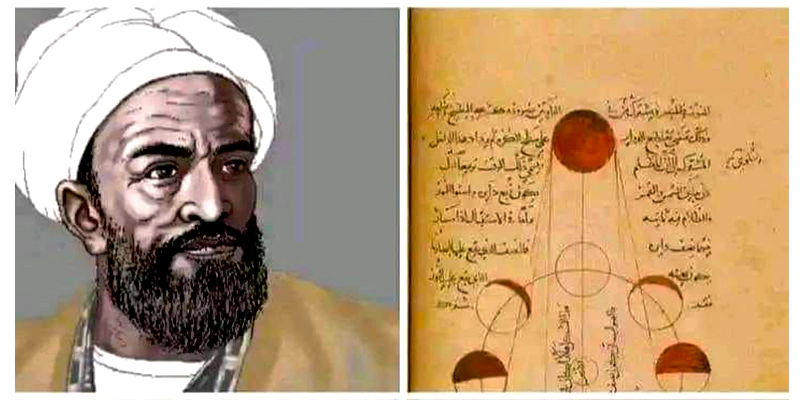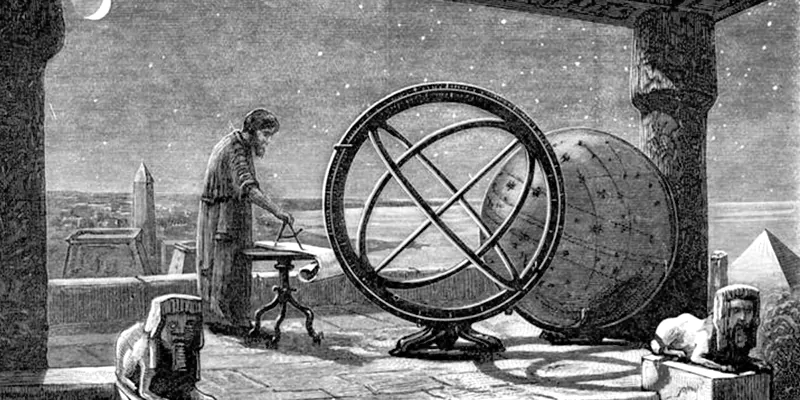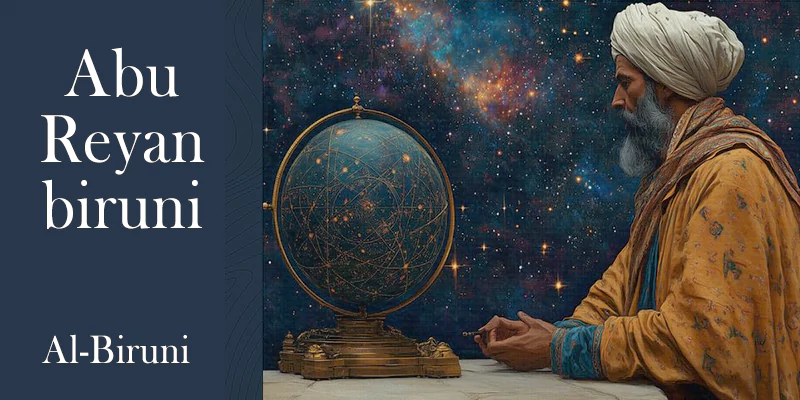- Parisa Adhami
- information
- 373 views
- 0 comments
Born in Kath, Khwarezm (present-day Uzbekistan), in 973 CE, Abu Reyhan al-Biruni was one of the most important academics of the Medieval Ages, which saw tremendous advancements in philosophy, science, mathematics, and culture. We also have Omar Khayyam, who is an astronomer and mathematician. Al-Biruni, regarded as one of the "fathers of geomatics," reflected the intellectual fluidity of his period with his multidisciplinary sense of wonder. His interdisciplinary works are valued for their inventive approaches, scientific rigor, and intercultural competence.
Table Of Content
Childhood and Education of Al-Biruni
Al-Biruni was born in Central Asia, known for its rich cultural diversity and idealized influence. He received training in various subjects, such as astronomy, mathematics, and languages. Al-Biruni immediately rose to fame in his community due to his exceptional insight and innate curiosity. The area's patronage culture, which valued and supported academic pursuits, made his scholarship possible.
Cyrus Crafts; Luxury & Unique Products
What are Al-Biruni's Achievements
Anu Reyhan Biruni is a unique character with a wide range of interests in literature, science, and the arts. Anu is passionate about investigating the connection between creativity and innovation. She likes to explore artistic expression through painting and design while keeping a close eye on technological developments and scientific breakthroughs.
1. Astronomy and Mathematics
Al-Biruni's deepest desire was astronomy, where he made meticulous observations and created ground-breaking mathematical models. In contemporary times, Maryam Miezakhiani is known for being interested in this field. In honor of Sultan Mas'ud of Ghazni, he wrote a thorough work on trigonometry and astronomy called Al-Qanun al-Mas'udi (The Mas'udi Canon).
In this work, Al-Biruni showed a sophisticated grasp of spherical trigonometry by presenting techniques for calculating planetary positions and celestial distances. Al-Biruni's contributions to mathematics established core ideas in the field.
He created complex techniques to compute algebraic expressions and tangents, giving astronomers and mathematicians of the future vital tools. In addition, he was one of the first academics to recommend that the Earth might rotate on its axis—a theory that would not be widely accepted until centuries later.

2. Geographical features and Geomatics
Geodesy, the scientific study of the size and shape of the Earth, is frequently credited to Al-Biruni as a pioneer. He accurately determined the Earth's radius in his famous book Tahdid Nihayat al-Amakin (Determining the Coordinates of Places). With careful observation and basic geometric concepts, he produced striking results similar to contemporary measurements.
Al-Biruni also created a technique for determining latitude and longitude, allowing more accurate navigation and mapping. His knowledge of Earth's curvature and geographical concepts played a key role in influencing later advances in cartography.

3. Science and Pharmacology
Al-Biruni was very interested in pharmacology, botany, mathematics, and astronomy. He offered useful applications for his research by tediously documenting plant species and medicinal substances. His book Kitab al-Saydalah (The Book of Drugs), which highlights the medicinal qualities of various plants, minerals, and animal substances, is a testimony to his pharmacological work. Another person worth remembering is Abu Ali Sina, famous in medicine during his period. His empirical approach to medical research anticipated the scientific expertise that would later define chemistry and pharmacology.
Cross-Cultural Studies of Al-Biruni
One unique feature of Al-Biruni's research was his knowledge of multiculturalism. His book Kitab al-Hind (The Book of India) offers a comprehensive observational study of Indian philosophy, religion, society, and culture. He wrote Kitab al-Hind while employed at the Ghaznavid court, and it is well known for its unique method of recording a distinct culture. By studying Sanskrit, which provided him with direct access to primary texts, Al-Biruni achieved a lot of knowledge about Hindu customs and practices. His remarkably likable descriptions reflect the respect for other cultures and scientific curiosity that are rare in works of that era.
Al-Biruni's Sight on Philosophy and Theology
Al-Biruni evaluated reason and observation over rigid adherence in his open, empirical approach to philosophy and theology. In contrast to many other academics of his era, he explored a wide range of philosophical ideas to find a balance between science and religion. Using the classical writings of Greek philosophers like Aristotle and Plato, as well as Islamic teachings, he viewed philosophy as a tool for comprehending absolute truths. Knowledge derived from empirical research was valued by Al-Biruni, who saw it as complementary to spiritual understanding rather than in opposition to it.
He was remarkably neutral and tolerant in his theological investigations. His comparative studies examined Hinduism and Islamic thought, particularly in his remarkable work Kitab al-Hind, highlighting similarities and distinctive insights without making judgments. Al-Biruni realized that a scientific approach and cultural empathy were necessary to comprehend various religious beliefs. He stood out from his contemporaries, who frequently treated non-Islamic beliefs with suspicion because he respected other traditions.
Al-Biruni supported empirical evidence as the foundation for understanding the physical world, even though he acknowledged God as a creator. His balanced, logical approach to theology and science helped to shape later scientific philosophy by opening the door for a more inclusive, empirically supported study of nature and metaphysics.
Influence of Al-Biruni on Other Researchers
Al-Biruni's writings have impacted the Middle East, Europe, and beyond. Later, Islamic and European scholars adopted his methods, especially in mathematics and astronomy. His systematic approach to research and dedication to empirical observation foreshadowed the scientific method, which European scholars would later formalize during the Renaissance.
Contributions of Abu Reyhan Biruni to Modern Science
Modern science attributes much to Abu Reyhan al-Biruni, especially in geomatics, mathematics, and astronomy. Early geography progressed because of his accurate calculations of the Earth's radius and his creative techniques for determining latitude and longitude. Al-Biruni established the foundation for pharmacology with his empirical study of medicinal plants in Kitab al-Saydalah, and he pioneered trigonometry concepts that are still fundamental in mathematics and astronomy. His Kitab al-Hind promoted scientific curiosity and intercultural respect by showcasing anthropological and cross-cultural studies. As a crucial figure bridging ancient and modern scientific thought, he influenced generations of scientists with his methodical, observational approach, which foreshadowed the scientific method.
You can find more detailed information about "Firuz Naderi," an effective contemporary academic, especially in astronomy and galaxies.
Last Words of CyrusCrafts on Al-Biruni
Abu Reyhan al-Biruni is still considered a titan of philosophy and science. He stands out as a pioneer of the scientific tradition because of his multidisciplinary expertise, creative methodologies, and respectful engagement with multiple cultures. In addition to generating new knowledge in his time, his contributions made an impact that has continued to motivate scientists, academics, and thinkers worldwide. Al-Biruni represents the spirit of inquiry, open-mindedness, and respect for knowledge that characterizes the best standards of human scholarship through his work.
Cyruscrafts is a dropshipping company located in Canada, Ontario. You can find any luxury product in the categories and order online or via WhatsApp.










Comments (0)